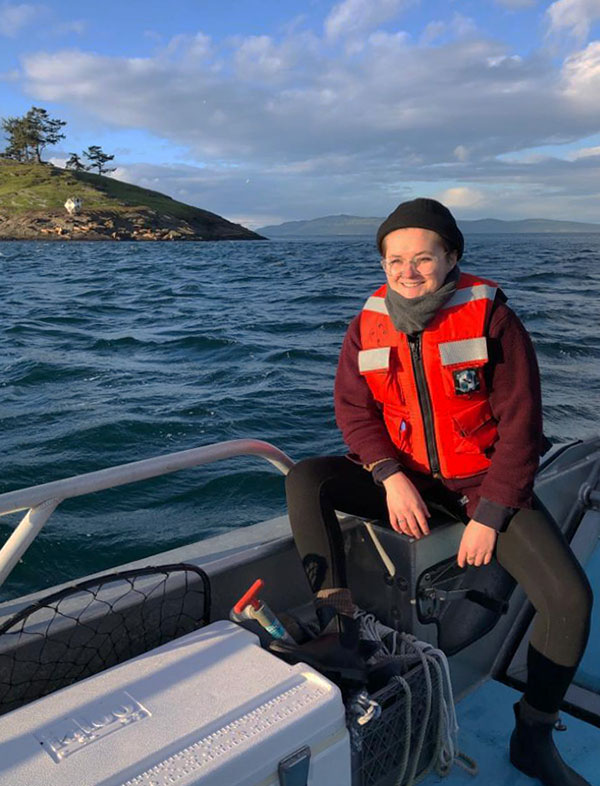Without realizing it, FHL planted a small seed in the back of my mind that day. When it came time to decide on which university to attend, that seed had taken root and was growing alongside my passion for marine biology. I was stuck between the University of Washington and another school, each having their own enticing programs and marine laboratories, but it was FHL that ended up tipping the scales toward UW. To me, the Labs and the San Juans had become almost synonymous with marine research. If I really wanted to dive into the world of ocean studies, I knew that the Labs would be one of the best places to gain the skillsets I would need. Within my first week of starting classes at UW, I made a point to plan out my academic track so that I could study at FHL. While my studies at UW took me from physical oceanography to Arctic cod otolith analysis to cetacean bioacoustics, I never lost that initial fascination with field-based marine research.

For my last quarter at UW, I took the Pelagic Ecosystem Function (PEF) Apprenticeship at FHL, where I developed and wrote my thesis. This program was structured to encompass all the motions of producing a research study – from hypothesis conception, to outlining, to data collection, to analysis, to writing and developing a paper and presentation – all compressed into a 10-week quarter. It was like the research equivalent of a doppio espresso drink: just pure, concentrated science. While this apprenticeship can sound daunting, I had already made Friday Harbor my home the summer before while interning for the SJCMMSN. That summer, I was able to walk in the footsteps of two people I had come to admire greatly, Jen and Joe, serving as an assistant to marine mammal strandings and necropsies. Now I was the one standing beside the thin black table, encouraging the students gathered on the pier above to come down for a closer look. My internship with the Stranding Network cemented my passion for studying marine mammals, so I came into my quarter at FHL eager to begin a research study of my own design.
Photo: Alyssa Scott aboard The Whale Museum's stranding response vessel
.
While my research direction shifted and morphed during my apprenticeship (as many projects do), the lessons I learned throughout my thesis made me a better scientist. Through collecting raw data in the field, to microscopic identification of phytoplankton, to analyzing a 14-year longitudinal data set, PEF allowed me to challenge and expand upon my limits as a budding researcher. With the help of my dedicated professors and the full arsenal of FHL at my disposal – a stockroom as expansive as Mary Poppin’s bag, a 24/7 computer lab with data processing software, and the ridiculously delicious meals served in the Dining Hall – I completed my thesis and graduated from UW as a competent scientist, ready for my next adventure. As the tides of life would have it, a few years later I find myself once again connected with FHL. Now, living full-time on island as the Coordinator for the SJCMMSN (who knew?!), I am once again working where my fascination started. Friday Harbor Labs has represented and given me so much. It brought me to this beautiful island that I call home. It gave me the experiences and confidence I needed to set forth on my career path. It led me to meeting the love of my life, both career-wise and partner-wise. And it continues to be a place that I’m overjoyed to work at (through association with The Whale Museum), and where I can inspire the next group of scientists who stand up on the top deck and watch the necropsies below.
If you ever see a stranded, entangled, or distressed marine mammal please call our hotline:
1-800-562-8832.
Photo below: SJCMMSN interns and staff take Level-A measurements on a live harbor seal pup.